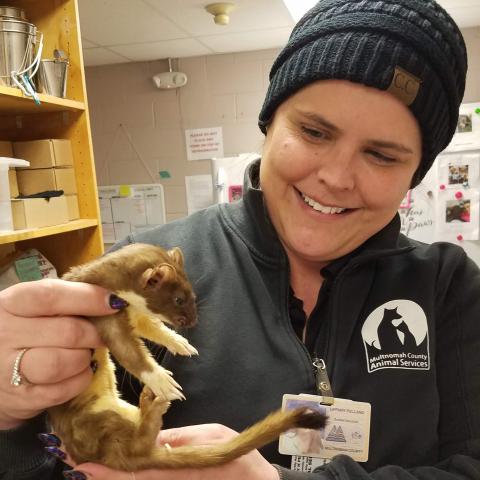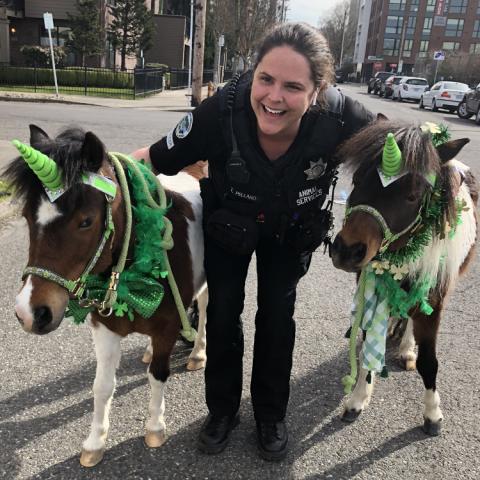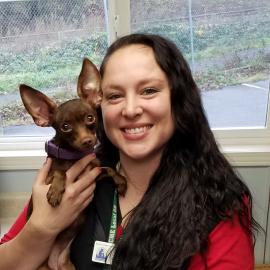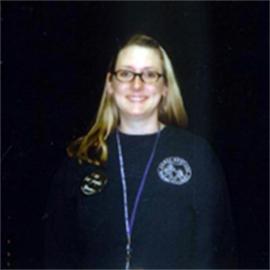Staff Spotlight: Officer Pelland - Five Years
Congratulations to Officer Pelland, celebrating five years of service to the pets and people of Multnomah County as an Animal Services Officer.
Animal Hospital Vet Tech
Officer Pelland had her first professional experience with animals as a kennel worker at a Santa Barbara, CA, veterinary hospital. She eventually worked her way up to be a critical care veterinary technician. Sometimes she would meet Hollywood celebrities. She remembers one night when a concerned Kevin Costner brought his sick dog to the clinic, and her team provided care. Costner later sent gifts for the staff, and even lent out his property for a summer work party as a way to thank the veterinary team who treated his dog.
Officer Pelland later served as a lead technician at a daytime veterinary practice.
Animal Control Officer
After taking a two-year break from her vet tech job to care for her oldest son, Officer Pelland moved with her family to Brigham City, UT, where she was hired to run the city’s animal shelter and provide animal control as an officer with the Brigham City Police Department. During her time with the agency, Officer Pelland increased her knowledge and skills as an animal control officer by taking trainings through the National Animal Care & Control Association (NACA), founded in part by Mike Burgwin, the first director of Multnomah County Animal Services. While these trainings weren’t required, Officer Pelland was devoted to the role, and wanted to be the best she could be with as much education as possible.
Her family moved to Oregon, and Officer Pelland was hired as an Animal Control Officer 2 at Multnomah County Animal Services.
Challenges
When asked about challenges she faces on the job, Officer Pelland asserts that one of the hardest things now during COVID-19 is finding a bathroom while she’s out on patrol.
“You have to have a strong nose to have this job,” Officer Pelland says. “We smell things that people shouldn’t have to smell. Doing this job pregnant was the hardest thing to do. First due to the smell, then midway through my pregnancy when I discovered I couldn’t run anymore.”
Interacting with People
Officer Pelland’s favorite part of being an Animal Services Officer is interacting with people, she says. “In this role, in different scenarios, it can really put you out of your comfort zone. It’s important to know that people have different backgrounds and cultures for how they interact, and how they live with their animals. Even people from different cities and states will have different approaches. It’s up to us to take the initiative to learn about and respect that. For example, I’ve seen some people react completely different with me than they did with a male officer. They were willing to speak with me and had respect for me, as a woman, that helped us establish a dialogue.”
Welfare Checks
A big part of the job is responding to requests for welfare checks. “I appreciate anyone’s observations and concerns for an animal,” Officer Pelland says. “I would never fault someone for calling and requesting a welfare check on an animal, because they’re concerned and they’re asking us to help. When we respond, our job isn’t to think about how we would care for our own pets, because everyone has an opinion and varying standards. My job is to address instances of cruelty or neglect, and to enforce minimum care standards for adequate bedding, shelter, space, food, water, and veterinary care. Whenever possible, we want to help pet owners meet those standards set by law.”
“What I want community members to know is that if we show up to speak with them, we don’t want to take their animals. Our ultimate goal is to help pet owners keep their animals and resolve any issues they may be experiencing, but we can only do that if people speak with us and find out why we’re there,” Officer Pelland says. “Initially, a lot of people are fearful when we’ve been called out for a welfare check, and may be resistant to speak with us. When they realize that we can be an asset to them and their pet, that we can provide guidelines and resources, the dynamic of the interaction can change. Sometimes we walk away with an apology and a thank you.”
Pets of Homeless Community Members
Animal Services receives many calls to check on the pets of community members experiencing houselessness. MCAS is aware that a portion of these calls may be misused in an effort to displace homeless community members, sometimes simultaneously with other official complaints to different agencies. While the vast majority of complaints officers investigate are concluded as being unfounded, every earnest call for a welfare check is taken seriously, and can also serve as an opportunity to check in and provide education and resources as needed. “We want callers to know that they’re doing the right thing by calling in their concerns, but we also want to conduct the welfare check without making the pet owner feel judged or singled-out.”
“Oftentimes, community members experiencing houselessness care more for their animals than someone in a home,” Officer Pelland says. “For the most part, they’re highly invested in the wellbeing of their animals, and it is often a community effort. I’ve seen entire groups rally around the pets of someone in the camp that needed help, or that they thought were in trouble. Sometimes they all pitch in to buy a resource or pay for a service for a pet. The bottom line is that just because an animal doesn’t have a house to live in doesn’t mean that animal is not sheltered, adequately cared for, and loved.”
Memorable Rescues
The work of an Animal Services Officer isn’t easy. “The experiences that stick with you the most are the ones with strong emotions behind them,” Officer Pelland remarks. “Those emotions aren’t always positive.” As first responders to emergencies involving animals, there are many cases involving cruelty, neglect, violence, injury, and pet loss that stick with officers.
Officer Pelland is happiest about instances where she is able to rescue animals in emergencies, often in partnership with other agencies.
“We had a case involving a beaver recently. I’ve also had two calls to help injured ospreys this year, and Portland Audubon's Wildlife Care Center is wonderful to work with, keeping us updated on how rescued wildlife are doing. Raptors are really majestic when you see them flying far away, then when you get up close and touch it, that’s really something. Birds are hard, too, because you have to know how to handle them safely. Yes, their beak can crush your fingers and their talons can injure you; however, the biggest issue is that our instinct when holding a squirming animal is to squeeze tighter, but they have to be able to physically expand their chest to breathe. You also have to make sure their wings are contained so they’re not injured further being carried or during transport.”
In September 2019, Officer Pelland rescued two dogs trapped in Beaver Creek Canyon with other personnel from Multnomah County Sheriff’s Office, and Gresham Fire Department- Station 75. “That was a real ordeal to locate and rescue those dogs, between the thick foliage and how steep it was. We heard them barking but it was pure luck that we spotted the dogs. It was really inspiring to see the way different community resources came together to help an animal. It makes you feel like you’re not alone, and everyone was invested in getting them up and out safely, including conducting a challenging high-angle rope technical rescue. Then the dogs were reunited with their owner. You can’t ask for a better outcome than that.”
“The Multnomah County Sheriff’s Office is really wonderful to work with. They’re always willing to help us out. They may fool people, but they’re big softies. Every time they bring an animal to the shelter, they come back for a visit to check on them. A few years ago, a Sheriff’s deputy [who would like to remain anonymous] responded to a report of a severely engorged goat with mastitis. He felt so bad for the pain the goat must have been experiencing that he actually milked the goat to express some milk and relieve her suffering before we arrived. Other deputies joked about it afterwards, but it was a really humane action to help that animal.”
Recognition
“I really want to thank my team- the other officers, dispatchers, and shelter staff- for their dedication and desire to help the community, and for being a voice for the voiceless,” Officer Pelland adds.” Animals speak if you know how to listen. I think our staff know how to listen and identify the needs of the animals. Once you listen, hear, see, and observe what’s wrong, sometimes it’s heartbreaking, and there are difficult decisions to be made, but it’s all appreciated and important. The line staff that the county has is the best there is. You can’t top the insight and ability of our team to be advocates and a voice for the animals.”
“I want to shout out to the officers and shelter staff who work with pet owners. There is so much emotion involved to be a family member of an animal that is lost or in distress, and they all handle it really well.”
“I also want to thank the community for their support they show us and the animals.”
Thank you, Officer Pelland, for your caring service to the pets and people of Multnomah County.



